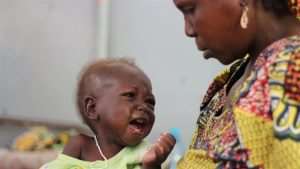
Stakeholders in the Northern Region have been urged to do more to address the high incidence of malnutrition in the area.
According to the Regional Nutrition Officer, Hajia Azara Amadu, the high incidence of malnutrition and stunting in the region does not augur well for human development in the region.
The Northern Region continues to record high levels of malnutrition and stunting among children.
Currently, 33.1 percent of children under five are stunted.
The high incidence of malnutrition contrasts sharply with the high number of NGOs in the region undertaking interventions to address malnutrition.
Health experts believe that the lack of coordination among these NGOs has a negative impact as they tend to duplicate their efforts in one area, while other areas suffer.
Hajia Azara Amadu, the Regional Nutrition Officer, told Citi News, that “among all the regions, we are having the majority of NGOs who support us because we are having a high incidence of malnutrition. Then you ask yourself why? What are we not doing right? So this calls for collaboration of NGOs so that we will all have a common platform to talk about what we are doing and which communities to avoid duplication.”
Meanwhile the Savelugu Municipal Director of Health, Denisia Agong has appealed to pregnant women in the area to take their nutrition seriously.
She said there is a high incidence of anaemia among pregnant women in the area.
“From our annual report, we realised that we have up to 66 per cent of anaemia among pregnant women at 36 weeks. This is so alarming because 36 weeks pregnant women are expected to give birth and so if at that stage, you don’t have adequate blood, to carry you through labour, you can be sure that anything can happen.”
She added, “There is no delivery that there won’t be bleeding and most of them deliver in the house, if you start bleeding, what will happen, That will contribute to a high maternal mortality rate in the municipality, we have recorded so far 4 maternal deaths since the beginning of 2019”
She was speaking on the sideline of stakeholder engagement to present findings of two radio series project which was aimed at promoting nutrition, agricultural practices and maternal health issues in Savelugu Municipality and Saboba District. This was led by Centre for Science and Health Communication.
Dr. Mahama Saaka a lecturer at UDS indicated that the project was also to find out the extent to which radio can reach out to people and make a behavioural change.
It was organised in partnership with the Texas A&M University School of Public Health in the United States, University for Development Studies, Ghana Health Service, Ministry of Food and Agriculture and Tamale Community Health Nurses Training College.
–citinewsroom




 Lay KPMG audit report on SML-GRA contract before Parliament – Isaac Adongo tells...
Lay KPMG audit report on SML-GRA contract before Parliament – Isaac Adongo tells...
 Supervisor remanded for stabbing businessman with broken bottle and screwdriver
Supervisor remanded for stabbing businessman with broken bottle and screwdriver
 NDC watching EC and NPP closely on Returning Officer recruitment — Omane Boamah
NDC watching EC and NPP closely on Returning Officer recruitment — Omane Boamah
 Your decision to contest for president again is pathetic – Annoh-Dompreh blasts ...
Your decision to contest for president again is pathetic – Annoh-Dompreh blasts ...
 Election 2024: Security agencies ready to keep peace and secure the country — IG...
Election 2024: Security agencies ready to keep peace and secure the country — IG...
 People no longer place value in public basic schools; new uniforms, painting wil...
People no longer place value in public basic schools; new uniforms, painting wil...
 'Comedian' Paul Adom Otchere needs help – Sulemana Braimah
'Comedian' Paul Adom Otchere needs help – Sulemana Braimah
 Ejisu by-election: Only 33% of voters can be swayed by inducement — Global InfoA...
Ejisu by-election: Only 33% of voters can be swayed by inducement — Global InfoA...
 Minority will expose the beneficial owners of SML, recover funds paid to company...
Minority will expose the beneficial owners of SML, recover funds paid to company...
 Prof. Opoku-Agyemang has ‘decapitated’ the NPP’s strategies; don’t take them ser...
Prof. Opoku-Agyemang has ‘decapitated’ the NPP’s strategies; don’t take them ser...
